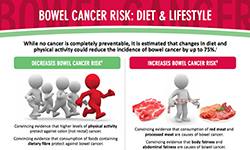More young people affected by bowel cancer
Bowel cancer rates doubled in young Australians 20-29 years and are up by 35% in 30-39 year olds over the two decades between 1990 and 2010.
The findings support other Australian and international research that has shown a worrying global trend towards a higher incidence of bowel cancer in younger people, especially given bowel cancer rates are stabilising or falling in over 50s.
According to the researchers, who reviewed Australia Institute of Health and Welfare data, the average age at which a bowel cancer diagnosis is made in Australia is 69 years.
About 7% of bowel cancers or 1,000 cases each year are in people younger than 50.
“Young adults have a relatively low risk of bowel cancer when compared to their older counterparts and therefore are unlikely to be offered screening unless they have a family history which falls under the national screening guidelines,” the researchers said.
Bowel cancer in young people is usually detected following investigation of symptoms such as rectal bleeding or abdominal pain.
However the consequence is that bowel cancer in young people is typically detected at a later stage of disease and has poorer outcomes. Bowel cancer in young adults is also more aggressive and more likely to affect the lower part of the colon or the rectum.
The research noted high-fat food prepared outside the home, increasing obesity, sedentary lifestyles and early diabetes were important risk factors – associated with bowel cancer in older age groups and increasing in prevalence in younger adults.
The researchers also identified the 3 to 5 fold increase in fast food consumption among children and young adults since 1970, increases in the consumption of cooked and processed red meat and decreases in milk drinking.
Bowel Cancer Australia chief executive Mr Julien Wiggins said the statistics supported the experience of the charity.
“We are contacted by so many young people with bowel cancer or their families. ‘You have bowel cancer’ are four words you don’t expect to hear when you’re young. Yet each year over 1,000 young Australians do.”
“That’s why we have recently launched our You’re Never Too Young initiative – to help improve awareness of bowel cancer, its symptoms and risk factors,” Mr Wiggins said.
Factors like My Genes, My Family, My Health, My Body, My Lifestyle and My Right can all play a contributing role when it comes to bowel cancer in younger people.
The researchers concluded that awareness and aggressive investigation of possible bowel cancer symptoms was vital to improving the outcomes for young people.
They said there was evidence that diagnosis of bowel cancer cases in young people was frequently delayed as doctors associated symptoms such as bleeding with minor conditions such as hemorrhoids.
The research was published in the Journal of Gastroenterology.

Fig. 1: What increases or decreases your risk of Bowel Cancer? (Click image to view pdf)
(Source: Bowel Cancer Australia, Journal of Gastroenterology)
Dates
Tags
Created by:

 Login
Login














